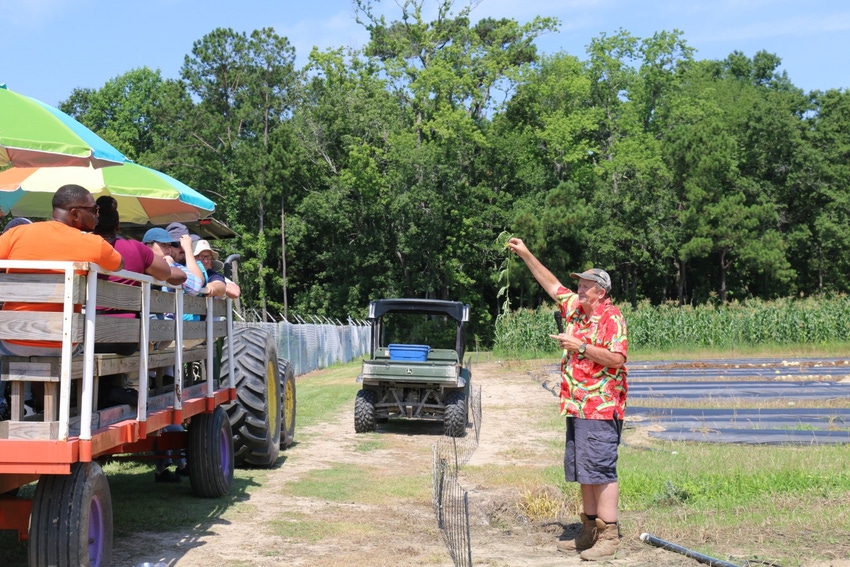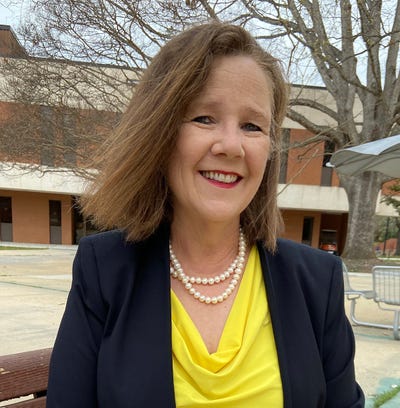
South Carolina vegetable growers learned the latest in disease, insect and watermelon research, and weed management during this year’s Coastal Research and Education Center/United States Department of Agriculture Field Day in Charleston.
One stop was at Tony Keinath’s Fusarium wilt research plot where visitors learned about the effects of this fungal disease on watermelons.
“Watermelon is grown in all 46 counties in South Carolina,” said Keinath, a vegetable pathologist. “Fusarium wilt is a destructive and widespread disease of watermelon in South Carolina, as well as the entire southern United States.”
Fusarium wilt is caused by a soilborne fungus. The fungus creates spores that live in the soil for many years. Fusarium wilt infects plants from Texas to South Carolina. It is a particular problem with seedless watermelons. Planting watermelons later in the season can limit this disease.
“Fusarium wilt is the main cause of watermelon collapse, wilt and dieback,” Keinath said. “Based on my research with researchers from the University of Georgia, cool soil temperatures are the most important weather condition that favors development of Fusarium wilt. Cool temperatures slow the growth of the watermelons and appear to make watermelons more susceptible to infection by Fusarium.”
Watermelons traditionally have been planted in South Carolina in mid-March. Delaying planting until late April, when soil temperatures are warmer, has been shown to reduce Fusarium wilt while not reducing yields. As the soil temperature tops 81 degrees, the disease becomes less common, Keinath said.
The ideal control of Fusarium wilt is planting resistant varieties, Keinath said. Grafting watermelon with squash and other disease-resistant plants shows promise in helping combat this disease.
More information can be found in the 2018 Southeastern U.S. Vegetable Crop Handbook, provided by the Southeastern Vegetable Extension Workers.
To learn more about how grafting helps control Fusarium wilt and other diseases, Richard Hassell, Clemson’s Cooperative Extension Service vegetable specialist, leads a team of researchers who are studying how grafting helps watermelon plants build resistance to soil diseases. To help get perfect plants for use in grafting, Hassell and his team are growing watermelon transplants in a special enclosed container or grow room.
Field day participants also learned about management of other diseases, insects and weeds. Sean Toporek, a graduate research assistant, presented research on Pythium management in cucurbits – plants in the gourd family, including melons, pumpkins, squash and cucumbers – and Matt Cutulle, a vegetable weed scientist, talked about proper weed identification, as well as using roller crimpers to control weeds.
Joe Maja, a research sensor engineer at Clemson’s Edisto Research and Education Center, demonstrated how technology benefits today’s farmers. Maja flew a drone while talking about how farmers can use technology to increase profits.
“These technologies can be used to optimize farming operations,” Maja said. “We are always working to develop new technologies that can be used to address current problems as well as future potential problems.”
Rebecca Schmidt-Jeffris, a vegetable and strawberry entomologist, explained how she and her team are researching how to control spider mites. Her study involves studying miticides, including Agri-Mek, Vigilant, Zeal, Portal, Oberon and Torac. Torac is not yet registered in watermelon or for mite control. Schmidt-Jeffris said the researchers will see how it compares to the other products.
Acramite also is registered for spider mite control in watermelon and has the same active ingredient as Vigilant. Vigilant is a new formulation the researchers are testing.
Ed Belken of Summerville was one of more than 100 people who attended the field day. Belken has a home garden and a pesticide license.
“I come to this field day because I know I am going to get the latest information for pest management, herbicide applications, planting techniques and more,” said Belken, who earned a forestry degree from Clemson in 1971. “Attending this field day also helps me get enough credits to renew my pesticide license.”
The next Clemson field day will be the Watermelon Field Day beginning at 8 a.m. July 12 at the Edisto Research and Education Center in Blackville. Gilbert Miller, Extension vegetable specialist and field day coordinator, said he and his team will share information about 24 different varieties they are testing.
“In addition, we’ll have information about a mini variety trial,” Miller said. “Watermelons grown in this trial only get about six to eight pounds. We have nine different varieties to talk about.”
Miller said information, such as weight, flesh color, sweetness and so on, are recorded and given to growers to help them decide what varieties to grow. More information about the field day will be available soon, Miller said. The Edisto Research and Education Center is located at 64 Research Road, Blackville.
About the Author(s)
You May Also Like






